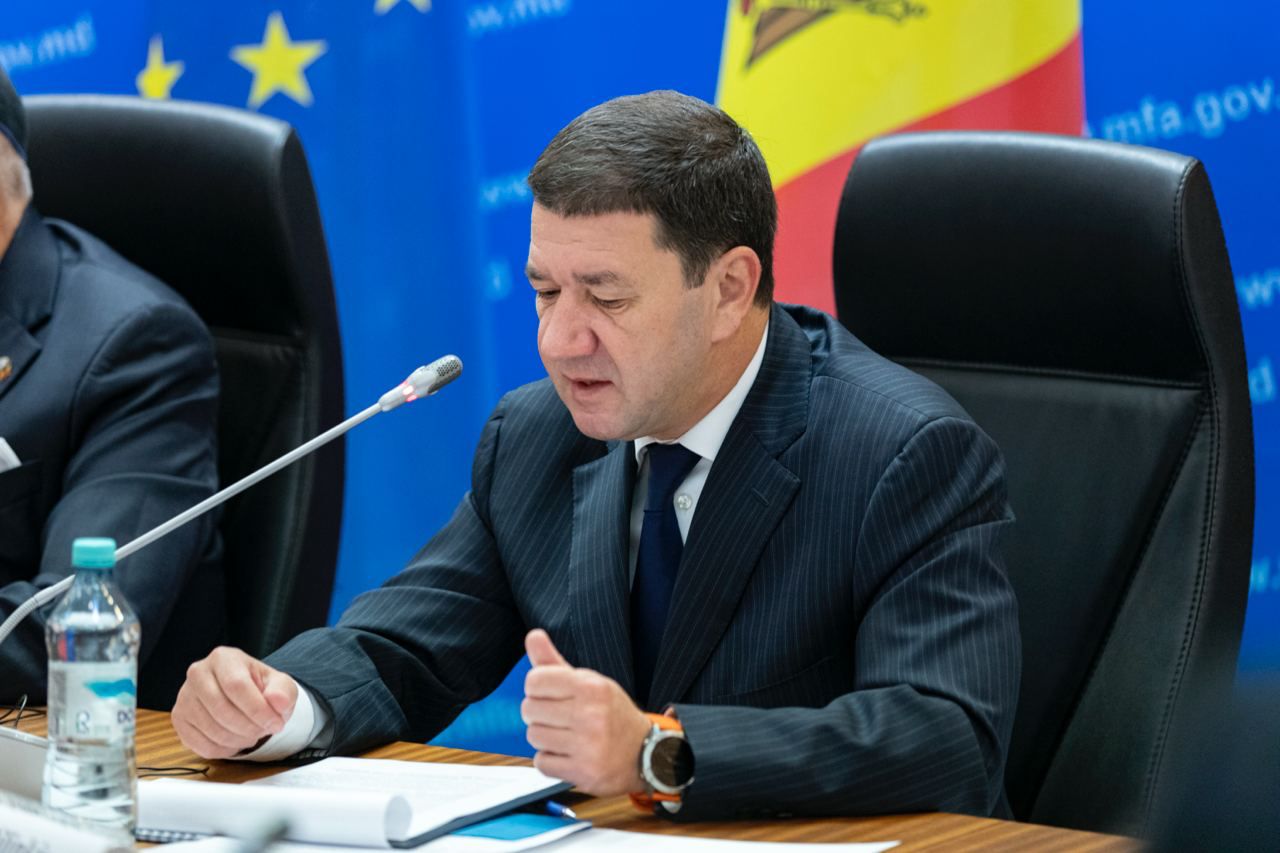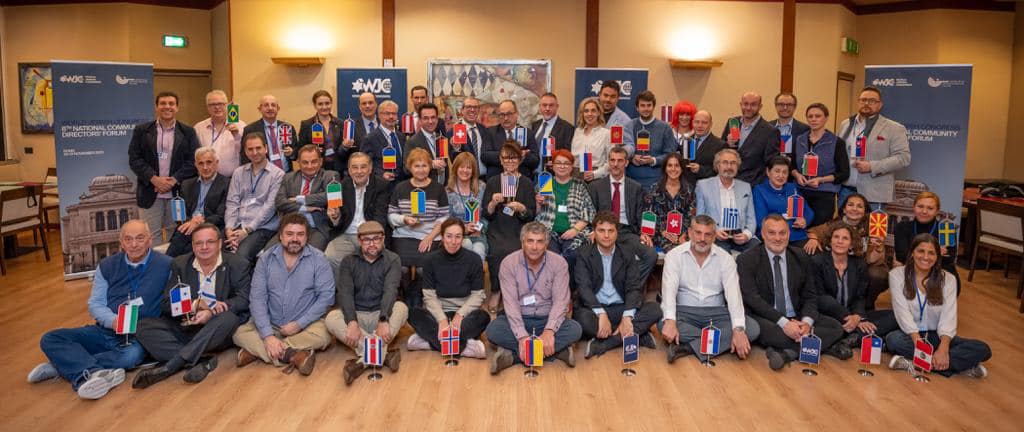High-Level Roundtable: “Holocaust remembrance – lessons from the past for a just future”

On Wednesday, 26 October, the Ministry of Foreign Affairs and European Integration of the Republic of Moldova hosted a round table event entitled “Holocaust remembrance – lessons from the past for a just future”.
Participants of the round table event were the ambassador of Israel to Moldova, HE Joel Lion, the President of the Jewish Community of Moldova, Mr Alexander Bilinkis, the deputy head of the OSCE Mission in Moldova, Antti Karttunen, Minister of Culture of the Republic of Moldova, HE Sergiu Prodan, the Ambassador at Large in the Ministry of Foreign Affairs and European Integration of the Republic of Moldova, HE Vitalie Rusu, Ambassador of Germany to Moldova, HE Margrethe Huebber, Ambassador of Poland, HE Tomasz Michal Kobzdej, Ambassador of Italy, HE Lorenzo Tomassoni, Ambassador of Sweden, HE Katarina Fried, Ambassador of the USA, HE Kent Lodgson, Ambassador of France, HE Paul Graham, representative of the World Jewish Congress, Dr Peter Cherry, representative of the World Organization for Restitution, Dr Ovidiu Creanga, Director of the Jewish Community of Moldova, Dr Aliona Grossu, Professor Nitza Davidovitch from Ariel University Genocide Research Center, Ion Duminica from the Institute of Cultural Heritage of the Academy of Sciences of the Republic of Moldova, Director of the Directorate of Human Rights, Protection of Human Rights and Council of Europe, Mr Dragos Hota, President of the Council for Preventing and Eliminating Discrimination and Ensuring Equality, Ian Feldman, and HE Corina Lungu from the Ministry of Education and Research.
Opening remarks on behalf of the Deputy Prime Minister and Minister of Foreign Affairs and European Integration, Nicu Popescu, were delivered by Ambassador Rusu, who welcomed participants to the roundtable event and acknowledged the contribution of national and international partners in implementing national policies on Holocaust remembrance.
Israeli Ambassador to Moldova, Joel Lyon, urged participants to keep in mind that the study of the Holocaust and preservation of Jewish heritage should be an essential part of Moldova’s history and cultural identity. However, Ambassador Lion lamented that efforts to commemorate those people from Bessarabia, modern-day Moldova, who died in the Holocaust had remained mostly at discussion-level and now was time to turn this talking into action. The ambassador welcomed the forthcoming opening of a museum on Jewish history in Orhei, although he expressed regret that it had not been opened earlier: “It is necessary that there is a place to commemorate not only those who died in the Holocaust, but also to celebrate and mark Jewish life in Moldova. To know white, we must understand black, and vice versa. Therefore, if we want to understand the Holocaust, we must first of all understand what the Jewish population of Moldova was, what role it played within the country, what part of society it formed and how it all came to a tragic end.’
Mr Lion placed a strong emphasis on the need to teach the Holocaust in schools though warned it must be approached without historical distortions, explaining that “we must show that we can accept the black pages of our history.” Prior to the pandemic, Ambassador Lion pointed out, teachers from around the world, including those from Moldova, attended seminars at the Yad Vashem memorial complex, and stressed that these teacher training programs will be renewed.
Alongside education and heritage projects, Mr Lion singled out restitution as another crucial direction in Moldova’s continuing attempts to grapple with its complex Jewish past: “When we talk about restitution, we are not talking about money, we are primarily talking about restoring justice. If, for example, there was a Jewish hospital in a city then the name of this hospital has to be restored so that people know that it was a Jewish institution. And only after doing that, can we discuss further issues. Recognition is the first step. Just like in psychology, you have to admit that something has happened. By acknowledging the problem, a solution can be found more quickly.” Illustrating his point, the ambassador referred to the Chekhov Theater in the center of the Moldovan capital of Chisinau. This Russian-language theatre sits on the site of what was once the Choral Synagogue but, Mr Lion pointed out, “there is no memorial plaque saying that it was one of the biggest synagogue in Chisinau.”
The ambassador noted that efforts are being made in Moldova to preserve this rich Jewish past and explained that the Israeli government is willing to assist with any Jewish cultural heritage project. Mr Lion concluded his speech by urging those gathered to reflect on how “’Never again” may sound good yet “active actions are needed and [Israel] is willing to help”
The President of the Jewish Community of Moldova, Alexander Bilinkis, then took to the floor to welcome participants of the round table event and emphasize that the format of the round table, which gathers diplomats, experts, leaders and members of Jewish organizations, reflects the traditional diversity of Moldovan society, which should be always be preserved and cherished.
Mr Bilinkis explained how Moldova has taken measures to preserve the memory of Holocaust victims through a myriad of different, but interconnected, ways: by strengthening legislative and regulatory frameworks, educational programmes and training in research, awareness of antisemitism, as well as heritage protection and protection of national minorities’ rights. All these measures are based on recommendations by the UN, OSCE, Council of Europe and International Holocaust Remembrance Alliance (IHRA). In addition, Mr Bilinkis praised the Moldovan Parliament for ratifying the Decision on holding an annual National Holocaust Remembrance Day in 2016, and for adopting the Political Declaration on the Final Report of the International Commission for the Study of the Holocaust in 2004. Moldova also introduced a second National Action Plan, developed by the Ministry of Foreign Affairs and European Integration in close cooperation with the Ministry of Education and Research, Ministry of Culture, Ministry of Justice, Agency for Interethnic Relations and the Jewish Community of the Republic of Moldova. The four-year document focuses on education and research, preservation of memory and heritage, and strengthening legislative and institutional frameworks for preventing antisemitism.
“The three thematic sessions of today’s roundtable: culture, education and legislation are the pillars of our work. However, lack of progress in the first two areas has unfortunately lead to serious consequences. This is where our colleagues from the law enforcement and justice systems come in. My main message today is: we need to invest more effort and resources in education and cultural heritage conservation projects, and make our plan to build a Jewish History museum in the capital a reality. We will soon open a Jewish History museum in Orhei, but that is not enough. We all have to join efforts: ministries and agencies, organizations and independent experts, international experts, so that the measures laid down in the Action Plan are implemented,” Alexander Bilinkis said.
The high-level roundtable brought together more than 70 participants from a range of countries, including Moldova, the USA, Israel, Romania, the United Kingdom, Germany, Italy, Poland, Austria, Sweden and Hungary, was held on the occasion of the 30 year anniversary of diplomatic relations between Moldova and Israel.
A photo album of this important event is available on our Facebook page: https://m.facebook.com/story.php?story_fbid=pfbid02ruKuWQsJz6RuDmYy4QrA9eLGKPmpDj2SkYpTbGDP1XJZbwHh7ssne45QhVfBT34el&id=1409493415993073
















